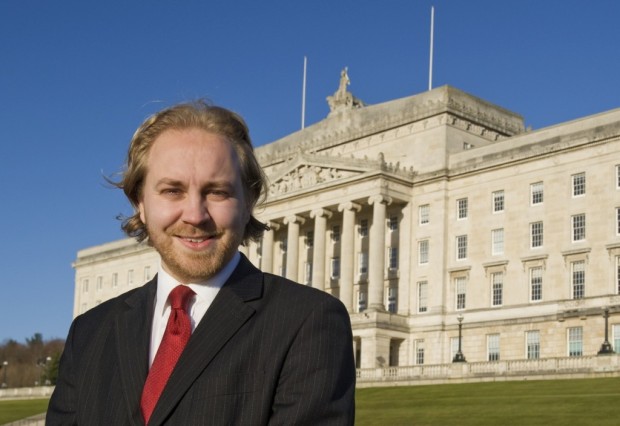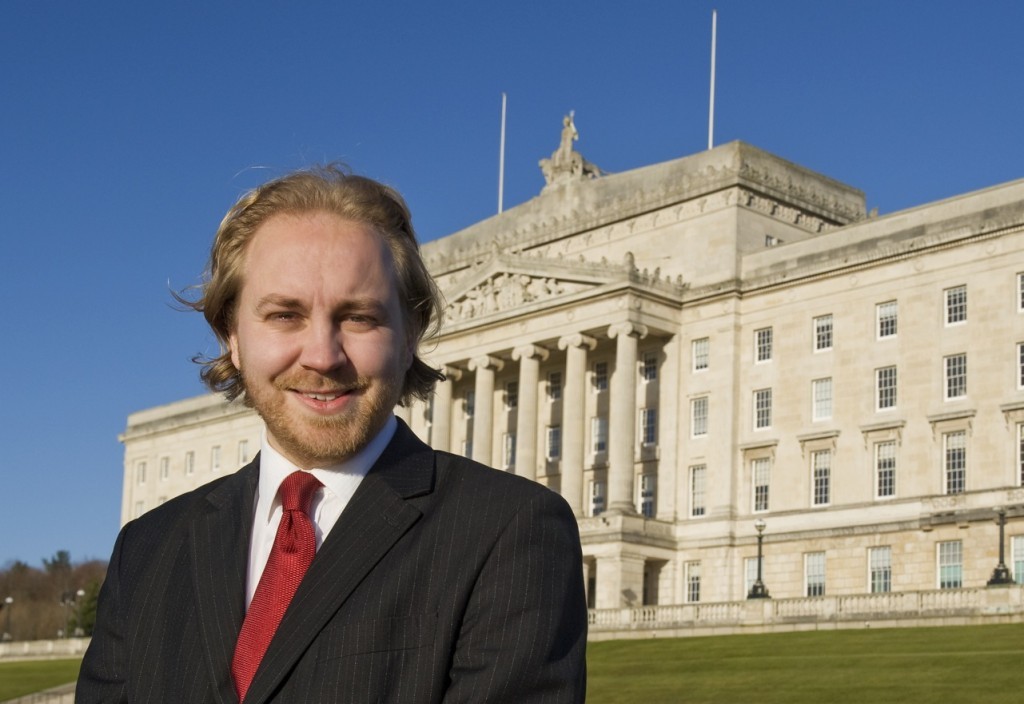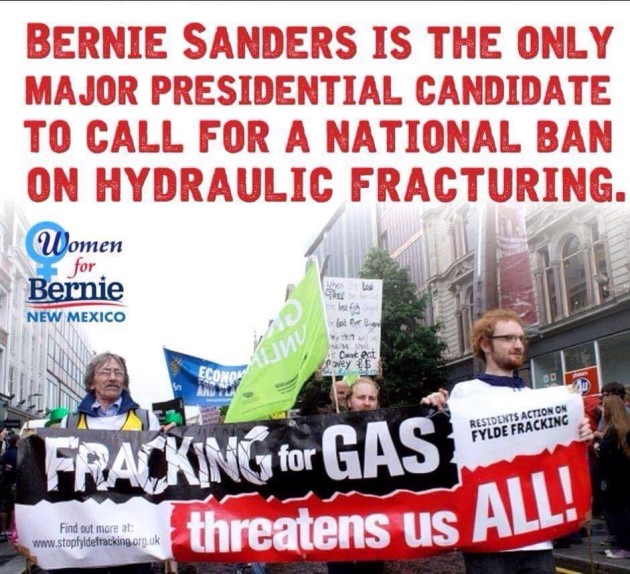Part 1 of our interview last week with the Green Party NI leader Steven Agnew focused on his early involvement in the local music scene and the anarchist movement around it, leading toward his eventual election and current role at Stormont. Here, we’re given a seldom-seen look into the – apologies – Kafkaesque system within which the only Stormont-elected member of a minority party has to work – overcoming contradictory policy, surrounded by homogeneous career politicians in the red-tape-encumbered uncooperative & uncommunicative system of departments that make up the Executive. It’s the devolution of power in more ways than one, much of the time.
They are a minority party whose actions – enacting a Children’s Bill and submitting amendments to abortions laws deemed inhumane in the eyes of the UN, pushing for transparency of finances amongst parties – represent a growing number of folk in NI unburdened by the strain of patriotism and tribal politics, who have felt their real-life concerns ignored by party politics. There exists an integrity and perseverance on principles with the arts, as well as environmental, social and economic concerns, and an actual acknowledgement of the thread of universality that runs through each.
Mr Agnew, inexplicably appearing in a poster for Women For Bernie, whose outsider persona has become something of a symbol and meme for underground cool and integrity – not a far cry from Agnew’s genuine character.
At the moment, which issues would you hold closest to your heart? As well as discussions on fracking and the environment in general, you’ve spoken at great length of the Children’s Bill.
The work with the children’s sector has taken priority for me. Climate change is huge, and I do what I can – I’ve now twice got the assembly to commit to a Climate Bill – it’s just getting it through the Executive to produce it that’s the hard part. So I’ve had progress and indeed my first ever motion was for moratorium on fracking, so I’ve had success in those bigger environmental issues. But I’ve always said that say when I went out to march against the Iraq War, it was a social justice campaign, but what John Barry taught me and what I hold fundamentally now, is that you can’t separate social justice from environmentalism, because climate change is increasing poverty globally, and fuel poverty is an environmental issue.
The kind of line I use now is: the environment is just where you live, from the house you live in to the planet you live on. An environmental NGO published the environmental sections of each party’s manifesto, and with ours they just had to send a link to the manifesto, because we didn’t have a link to the environmental section; it was the thread running throughout. The problem with most parties is that they have an environmental section, but their economic section runs completely contrary to environmentalism. So it’s low regulation for businesses to come in and rape & pillage the land, “but it’s ok because we’ll fund environmental education in schools”. You have to change the economy for the betterment of society and the environment.
In Northern Ireland, the environment minister is consulting seeking consensus around the climate bill, which is shorthand for “I can’t get this past the DUP so I can’t bring it to the Assembly”. But, what I would be seeking would be targets for carbon reduction including interim and long-term targets. I would like to tie in with that targets for renewable energy – a 40% target renewable energy production by 2020. I think we need a longer-term target, if not specifically for renewable energy generation, for decarbonisation. We need energy efficiency targets, which are often the poor cousin of the whole argument, but is fundamentally what we need to do.
And again, it comes back to that environmental and social justice thing. We have more people die per head in Northern Ireland due to winter-related deaths than Finland. Finland temperatures get to -30° in some parts, but there are people here dying of the cold who could live in Finland. And that’s because we don’t invest in our housing infrastructure, we don’t value energy efficiency and indeed, just today I was in Kingspan, who produce solar thermal panels, and they were selling to the Housing Executive, but then again DUP minister Nelson McCausland changes regulations and now says it’s not required in the Housing Executive and social housing anymore, thereby stopping one of the things we were doing to reduce fuel poverty.
And now we have no funding for renewable energy.
Yeah, it’s a policy that’s largely handed down from the Tories – another thing we have to thank them for – but yes, the applications deadline has passed. There was a grace period for a year extension for the renewables in progress but the Tories were very clear they were ceasing subsidies for wind. And a lot of people make arguments around fuel poverty and an increase in energy bills, but the thing they often leave out is that we’re still subsidising fossil fuels. For example, we have a target to have 100% of Housing Executive homes on gas by 2035, while most evidence says we need to be fossil fuel-free by 2050.
So, by 2035 we’ll need to retrofit all those homes again to get them under renewable. That, in effect, is a sort of indirect subsidy. We’ve just built a new gas power station in Northern Ireland, which has put 1% on consumer bills. We’ve had a direct government subsidy of £32 million for a gas pipeline to the west. There’s always talk in the media about the cost of subsidising renewables, but what they often leave out is 1. that we’re still subsidising fossil fuels, which are supposed to be mature technologies, and we should have come off the subsidy tap, but also that renewable industries – wind and solar – have said that they could be subsidy-free by 2021. So it’s very short term to cut them now and hinder those industries, if not destroy them when they themselves have set a timeline to be subsidy-free.
Remember when the Tories were green?
Ah yes, when they were ‘The Greenest Government’ and changed their logo to a tree.
What does your Children’s Bill consist of?
The key element is a statutory duty to co-operate. It sounds like it should be obviously happening, but the evidence is that it isn’t. But government departments should be required to work together for children. It’s something that comes to the heart of how we do government in NI, and it’s certainly not unique here. There’s a statutory duty to co-operate in England, so it was obviously felt it was needed there, that’s been in place since 2004. It exists in Scotland where most of the evidence is that they do joined-up government better, but still felt the need to introduce theirs, to introduce it in their Children & Young People Act.
Essentially, it requires government departments to work together. For example, it comes up a lot around special education needs, where a child in school needs physio. Schooling is the responsibility of the Department of Education. If a physio is needed, it’s a health provision, but it’s in an educational setting, so you get both departments arguing over who should fund it. My point is: government should fund it. Your two arms of government are the guarantors of public money, and the public would pretty much say “If that child needs physio to get through her education, then provide the physio.”
Are they taking issues that should have no bearing on ‘what side they are’ and essentially making it into an us vs. them issue?
We get unionism vs nationalism debates that aren’t about unionism or nationalism, but are about left-right politics. And unionism tends to be to the right, with the exception of the PUP, who are obviously outside the Assembly – while nationalism tends to be to the left, although there are certainly elements within nationalism that are more conservative. But, to be fair on this issue, it’s not even just about ministers in their posts, but cultural issues within departments operating in silos, so regardless of who the ministers are, particularly between health and education, there’s a longstanding cultural problem with joined-up thinking.
When did this issue present itself?
The time the penny dropped with me that this was a problem was when we had a draft ‘Early Years’ strategy, which is supposed to cover children from 0-6 years old. All the evidence says that this is the time in a child’s life where you can really make a difference. Yes, what schools do is educate, but you’re not going to instantly turn around a child who has suffered social disadvantage, at age 11, say. It’s a lot harder. It takes a lot more resources and it’s very difficult to do, but at 0-6 you can really make a difference to a child’s life, and that includes pre-natal.
I was presented by a member of the group for Children and Young People Group with this draft Early Years Strategy, presented by the department of education. I was a researcher at this stage for Brian Wilson [their first MLA], and I asked the very simple question “What’s the Department of Health’s role in this?” and was told “None. This was a Department of Education stategy”. The problem with the 0-6 strategy being run by the Department of Education is that children don’t come into contact with education until, at the very earliest, age 3. So their 0-6 strategy started at age 3, or 4 at primary school. They were embarrassed by the responses to the point where the strategy was scrapped.
But, that’s going back to around 2010. The motion that’s going through the assembly now is the Special Needs & Disability Bill. Again, it’s coming from the Department of Education, despite the fact that Departments of Health, Employment & Learning, and Justice all have contact with children with special education needs. But we have had the Education Minister repeatedly state “I can’t legislate for the Minister of Health” when myself and John McAllister [independent MLA] effectively asked the Minister, “What would it take for you as a member of the government to effectively legislate for another part of government?” He replied: “I would need his permission”.
So, well, get it? So that’s the kind of thing that frustrates me, and that’s the type of thing that bills seek to attack. It’s often said that there’s no opposition in NI, and I would argue that almost everyone is in opposition. Those who have ministries will be in opposition to other departments and ministers in the same government, and we don’t really think in terms of government in Northern Ireland. Government is something that’s at Westminster. Technically what we have is an Executive, but it’s essentially Northern Ireland’s government, and we need our government to act as a single government instead of a collection of ministers and departments, which is what we currently have.
It’s essentially The Thick of It.
The Thick of It is the closest. It always results in me saying “That happened in our office today”.
Is there any progress in integrated education right now?
The big thing now is ‘Shared Education’. When you speak to the integrated education sector, they’ll say: “We have to work with shared education and within it” as it’s in the government program. There’s £5 million in the so-called Fresh Start deal for shared and integrated education. The problem for me with Shared Education is that it can be two schools sharing the same building, with different uniforms, different principals & teachers, with just some requirement of overlap. I’ll go back to my own schooling. I effectively went to a Protestant school, and once a year we went to the nearest Catholic school to give blood. Is that sharing? And if it is, should we be firing huge sums of public money at it?
I want to see children being educated together and that should be the benchmark. I have to be fair – I think there’ll be good examples of sharing, but I think there will be those just as I described, and we’ll still have one school on a day trip to the Maze and the other to Long Kesh, you know? Until we get beyond those things…
The problem we have is that we have 64 integrated schools, and there are a lot of barriers to increase that. Father Tim Bartlett of CCMS stated he would rather see a school close down than it become integrated. Until very recently, we’ve never had a CCMS school become integrated, and there is a big resistance. The theory is that if parents of a school demand integrated status, they’ll get it, but it shouldn’t have to be parent-led, and my problem with shared education is that it began as the problem of falling classroom numbers – schools were becoming unviable because we had a segregated system, whereby in one town you have two schools when you only needed one. So, the obvious solution would be to create one integrated school rather than two schools of different denomination, but instead what’s happened is to keep the two schools in just one building.
The evidence is that parents do want integrated, so every time there’s a poll, Belfast especially, seems to have the highest proportion of people saying they want to have integrated schooling. I often get told ‘people vote with their feet and they’re going to segregated schools’, but that’s only because that’s what’s there. Saying people don’t want integrated schools is like saying people in NI don’t want sunshine. Just because we live somewhere that doesn’t have it doesn’t mean that it’s something we don’t want. And if there’s only 64 integrated schools out of 1200, how can you choose?
You’re the only party who publishes any donations of over £500. Why is that?
We have the anomaly in Northern Ireland where you don’t have to publish your donations. So, across the UK, any donations from a single source in a year for over £7500 have to be declared to the Electoral Commission. For England, Scotland & Wales, those figures are published, but the historical reason here is because of the Troubles – the idea that people or businesses could be targeted because they give to a particular party – and that was fine. We took down the watchtowers, we took soldiers off the streets, we stopped security checks in the shops. It’s now time for politics to step up. The Alliance party publish their return, to be fair, but the return every year says “We’ve received no donations over £7500”.
We realised that if we published only £7500 then we have nothing to publish, so we made the decision to publish over £500. We had only 2 people donating over that at that point, and anything under £500 is administratively difficult, so we continue to do that and continue to press for transparency across the board. But what I believe has happened is conversations with the secretary of state, because legislation rests with Westminster, to essentially allow parties here to get their house in order.
So there is an intent from Westminster to bring Northern Ireland into line with the rest of the UK, but parties are being given time to get their house in order, because I believe that there would be parties who would be embarrassed by where they’re receiving donations – and also if you start looking at who’s donating to parties now and some of the decisions being made…and I certainly couldn’t prove any of those things; but nor can the parties prove otherwise because they’re not being transparent.
Following the High Court’s ruling on NI abortion laws and their violation on the Human Rights Act, have any feathers been ruffled in Stormont?
Undoubtedly. It hasn’t been publicly debated at the Assembly at this point, but we had the situation where we were anticipating certainly legislating being brought forward for fatal abnormality and possibly sexual crimes. We had the situation where we thought the DUP were going to have a free vote on fatal foetal abnormality, which would be a huge step forward in my view, and I don’t know what happened internally within the party, but they went from that to very clearly blocking any legislation coming forward. And that’s an amazing change.
The Sarah Ewart case really changed the public debate on it, and I think a lot of people who would have had the so-called pro-life attitude saw in cases of foetal abnormality that there was a compelling case for some degree of liberalisation, and it looked like the DUP were going to allow an open and transparent debate to take place, but they rolled back on it and said they would block any legislation from coming forward.
I had considered and still am considering if it’s a necessary amendment to the justice bill in cases of fatal abnormality. Sexual crimes might be more difficult legislatively, and if I can do it, I certainly would. But we now have the court’s ruling that it must happen, so it’ll be interesting to see if it takes legislation or if it can be done through guidance, but the health minister has now issued guidance to the executive, so we’ll see if that deals with the issue or if legislation needs to be issued. I’ll certainly be keeping an eye.
[An official statement has been made this week by the Green Party, who have submitted amendments to the current Justice Bill which, if passed, would allow abortion in cases of fatal foetal abnormality and where conception was the result of rape or incest]
What is with the petition of concern, from the perspective of someone whose policies don’t revolve around Unionism & Nationalism?
The Fresh Start deal does look at the petition of concern, and one of the things is the move away from private members’ movements coming from the Executive, that can bring forward legislation through a bizarre situation where a member of Sinn Fein called for the Sinn Fein minister to do something. There is a movement away from that, though, and one of the things we’ve always believed in is getting rid of this designation from the start, because all the petition does is trigger a so-called cross-community vote – the irony being that if you’re a cross-community party, your vote doesn’t count.
Because I don’t designate as a unionist or nationalist, it’s a measure of whether there is sufficient support on the unionist or nationalist side. I’ve argued that my vote should count at least half on each lobby. Get rid of that designation, as it enshrines, for me, sectarianism. And I think this is one case where nationalism is holding us back, because there’s always this fear – and I understand it – of going back to unionist rule. But I think there’s been a lot of trust asked of unionism, in terms of changes to the police – and rightly so – necessary changes, but trust that there’s a genuine desire to move away from that history of unionist rule.
That’s not to say there should be no safeguard, but I think a weighted majority vote is the way to take that. Green party policy requires a 2/3 majority to change Green Party policy, and having somewhere between a 60-66% weighted majority in the Assembly. You have the danger of setting it too high, say, 66%, where if you have one party with 35% of the vote, they have a veto. If you set it too low, you may get a unionist coalition. But I think if you go through to that weighted majority, you’re always going to need the DUP or Sinn Fein for something to go over the line. I think that should be sufficient protection from this idea that we enshrine forever that NI politics must be about unionism and nationalism.
Can anything be done about the so-called Conscience Clause, in light of its prevention of equal marriage, despite a majority vote in favour?
So, we got our first ever majority, so that’s a big step. And I know it was a narrow majority, but it was an important symbolic vote, and I think the next Assembly, and again, in time will develop. Whether or not the DUP will ever move, I think perhaps for as long as there’s a petition of concern, it’s unlikely we’re going to get it democratically. There are court cases taking place and in the pipeline to challenge the rule, for example, if a couple gets married in the South and comes up north, their marriage is somehow downgraded to a civil partnership. That’s where you’re going to see the challenge, I think.
There’s also the issue of human rights. The European court of human rights is that it’s for a state to decide its marriage laws. Northern Ireland as a region of the UK hasn’t, so there’s an argument that while a state can decide, within a state you can’t have that discrepancy. So these things all have to be challenged legally, and I think the one thing I’m pleased about now is that you can say that, if it is decided by a court, both through polling and that vote in the Assembly, that a majority of people want this, so while it wasn’t done through democratic institutions, it won’t be anti-democratic because the numbers are in support.
Finally, a case close to our hearts – it’s brilliant to see Arts’ Council funding return to some kind of state of equilibrium. How did it happen?
I’d love to take credit for the reinstatement of funding, but in that case it was done through a monitoring round, which is essentially where any money that hasn’t been spent that was allocated gets put back in the central pot and dished back out again. It’s often unkindly referred to as “money found down the back of the sofa” but it is a sound financial process whereby we have – now the November monitoring round was tied up with the Fresh Start deal, but normally you have your October and January, as well as June rounds. And it’s just a point of allocating you a certain amount of money. If you haven’t been able to spend it, give it back and we can re-allocate it for more urgent things, and that’s where the Arts Council funds came from.
You’ll find that with a lot of departments, where they haven’t been spending a lot of money due to the fear of if a deal hadn’t been done, there was a fear of this £200 million hole in the budget, so you don’t want to spend money and find a massive cut in-year. So I think that’s what happened with the arts council funding. Everyone was being conservative with their spending, and now there’s a deal. There’s been a bit of relaxation, whilst still having huge cuts across the board, but it has allowed some programmes to be reinstated that looked like they wouldn’t be.
Our rare political love-in concludes with a forthcoming Monday Mixtape from the Mr Agnew.
“If you’d like to do a 10-track Spotify playlist for the site, we’ve had Lee Ranaldo and members of Yo La Tengo, so…
There’s company to keep, I’ll definitely have to think about that. I’m one of those people who laments technology. I miss making mixtapes. I wouldn’t even have the equipment to make or play it on anymore, but I was a big fan. High Fidelity was always one of my favourite books – the rules of making mixtapes. I’ve never sat down to think about it, but a lot of the things in there, I’m going “Yep.” I mean, Spotify playlists are today’s modern version, but the mixtape is sorely missed.”







